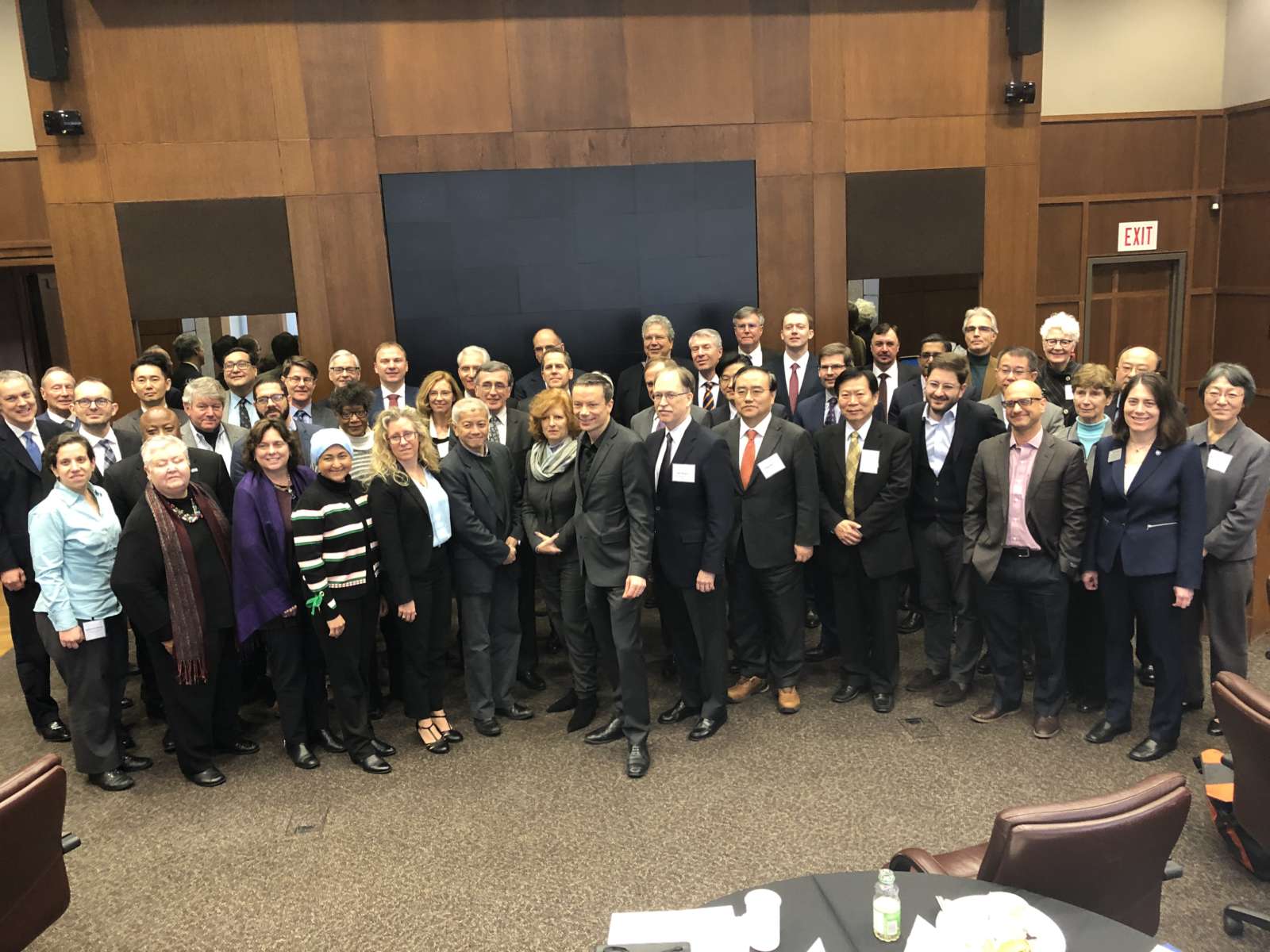2019 Deans' Meeting Looks toward the Future
On January 10-11, 2019, 46
representatives from 41 schools in 12 countries gathered in Toronto for the
annual APSIA deans/directors meeting, hosted by the Munk School of Global Affairs and Public
Policy. The interactive meeting included discussions of
innovation, faculty diversity, and fundraising, as well as a conversation with
Deputy Foreign Minister Ian Shugart.
On Thursday, January 10, APSIA
members gathered for their annual meeting. A number of new deans were present,
including many who were the first female dean of their school.
Members found commonality as they shared their success from the previous year. They discussed new collaborations with other disciplines within their university. Many were celebrating milestone anniversaries. They also shared plans for faculty expansion to include expertise in engineering and computer science.
Following that discussion, Carmen Mezzera, APSIA’s Executive Director, provided an overview of APSIA’s work in 2018. She described programming in eight areas: deans/directors, admissions, alumni relations, career services/employer relations, communications, development, diversity, and public outreach. APSIA continued its Diversity Forum series to reach multicultural US young professionals. It also sponsored a networking reception for 200+ students, alumni, and employers in Washington DC, recruitment events in Atlanta, DC, London, Madrid, Montreal, New York, Paris, Philadelphia, and online, and numerous public presentations around the world.
Janice Stein, Professor and Founding Director of the Munk School, facilitated the next segment of the meeting. She asked Peter Cowhey, Dean of the University of California, San Diego School of Global Policy and Strategy, and Manuel Muñiz, Dean of the IE University School of Global and Public Affairs, to talk about ways APSIA schools can innovate to fulfill their missions. Both deans agreed that APSIA graduates must have a life-long learning approach to navigate a rapidly changing environment.
Several attendees talked about the need
to bring different disciplines together to build “complementary competencies.” Others
cautioned that APSIA schools must preserve their distinct attributes, such as
regional studies, which are in demand even from technology companies. Danny
Quah, Dean of the National University of Singapore Lee
Kuan Yew School of Public Policy, stressed the need to balance “globally
common” issues with those that are “globally diverse.”
Laura Bloomberg, Dean of the University
of Minnesota Hubert
H. Humphrey School of Public Affairs, opened the final discussion of
the day with a look at changing enrollment at APSIA schools. Attendees also considered the many ways to
evaluate student diversity and student quality.
After
the member meeting, participants moved to dinner and discussion with
representatives of APSIA affiliates and guests.
January 11 opened with a lively discussion
with Deputy Foreign Minister of Canada Ian Shugart, moderated by Randall
Hansen, interim dean of the Munk
School. Mr. Shugart shared his thoughts on the changing rules-based
international order and speculated about what those changes mean for APSIA
schools. He urged APSIA schools to give students the tools to navigate the
digital world, to be good citizens, and to challenge the status quo without
being cynical.
Next, Philippe Burrin, Director of the Graduate Institute of Geneva, invited attendees to share strategies for attracting and retaining diverse faculty. Attendees recommended a mix of carrots and sticks to diversify pools of candidates and mentor future leaders. The discussion also considered some of the structural barriers to increasing diversity.
Over lunch, Enrico
Letta, Dean of the Sciences Po Paris School of International Affairs,
moderated a conversation about internationalization strategies amid
growing nationalism. To begin, he invited Martin Kahanec, Head of the Central
European University School of Public Policy, Judith Kelley, Dean of the Sanford School of Public Policy
at Duke University, and Sung-han Kim, Dean of the Korea University Graduate School of International Studies,
to share their personal insights and experiences.
Participants described the opportunities and challenges of leading schools with a global mission at times of rising nationalism. These trends impact what schools teach, the students and faculty they can attract, and how they frame their work locally, nationally, and around the world.
Finally, Monica Hahm,
Director of Development for the Munk
School, moderated a conversation on fundraising strategies. The discussion
featured Michael
Barr, Dean of the Gerald
R. Ford School of Public Policy at the University of Michigan, and
Merit Janow, Dean of Columbia University’s School
of International and Public Affairs.
Both speakers agreed that major gifts come from years of preparation and gestation. To succeed, you need visionary ideas and collaborative structures of support within your school and at the university, they said.
In conclusion, Reşat Kasaba, President
of APSIA and Director of the University of Washington Henry
M. Jackson School of International Studies, encouraged everyone to
join APSIA back in Toronto in March at its reception
during the 2019 International Studies Association meeting.

